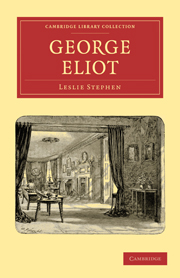Book contents
- Frontmatter
- Contents
- CHAPTER I EARLY LIFE
- CHAPTER II COVENTRY
- CHAPTER III “THE WESTMINSTER REVIEW”
- CHAPTER IV “SCENES OF CLERICAL LIFE”
- CHAPTER V “ADAM BEDE”
- CHAPTER VI “THE MILL ON THE FLOSS”
- CHAPTER VII “SILAS MARNER”
- CHAPTER VIII MIDDLE LIFE
- CHAPTER IX “ROMOLA”
- CHAPTER X “FELIX HOLT”
- CHAPTER XI “THE SPANISH GYPSY”
- CHAPTER XII “MIDDLEMARCH”
- CHAPTER XIII “DANIEL DERONDA”
- CHAPTER XIV CONCLUSION
- INDEX
CHAPTER XIV - CONCLUSION
Published online by Cambridge University Press: 05 July 2011
- Frontmatter
- Contents
- CHAPTER I EARLY LIFE
- CHAPTER II COVENTRY
- CHAPTER III “THE WESTMINSTER REVIEW”
- CHAPTER IV “SCENES OF CLERICAL LIFE”
- CHAPTER V “ADAM BEDE”
- CHAPTER VI “THE MILL ON THE FLOSS”
- CHAPTER VII “SILAS MARNER”
- CHAPTER VIII MIDDLE LIFE
- CHAPTER IX “ROMOLA”
- CHAPTER X “FELIX HOLT”
- CHAPTER XI “THE SPANISH GYPSY”
- CHAPTER XII “MIDDLEMARCH”
- CHAPTER XIII “DANIEL DERONDA”
- CHAPTER XIV CONCLUSION
- INDEX
Summary
The Leweses had been in the habit of recruiting their health in various country places in the neighbourhood of London, as well as in occasional trips to the Continent. In 1876 they bought a house at Witley, near Godalming, in the charming Surrey country which looks up to Hindhead and Blackdown. They were neighbours of Tennyson, who saw them occasionally both there and in town. An anecdote of a quarrel between them is refuted by Tennyson's son. What really happened was that, as she was leaving his house, Tennyson pressed her hand “kindly and sweetly” and said, “I wish you well with your molecules!” She replied as gently, “I get on very well with my molecules.” Tennyson held that the flight of Hetty in Adam Bede and Thackeray's account of Colonel Newcome's decline were “the two most pathetic things in modern fiction.” He greatly admired her insight into character, “but did not think her so true to nature as Shakespeare and Miss Austen.” I will not argue upon such dicta, though they are interesting in regard to both persons. George Eliot was more or less acquainted with other eminent writers of her time. The Leweses stayed with Mark Pattison at Oxford, and afterwards with Jowett, who sent them the proof-sheets of his Plato. Dickens was friendly till his death, and she speaks with affection of Anthony Trollope, “one of the heartiest, most genuine, and moral men we know.” Their life, however, continued to be secluded, and they thought of retiring altogether to Witley.
- Type
- Chapter
- Information
- George Eliot , pp. 192 - 206Publisher: Cambridge University PressPrint publication year: 2010First published in: 1902



